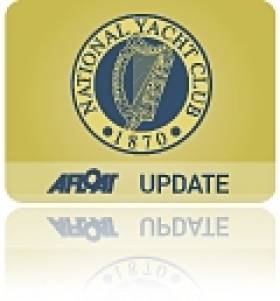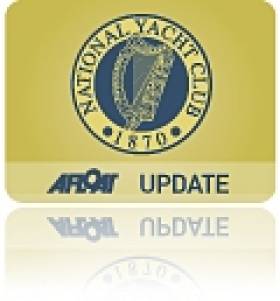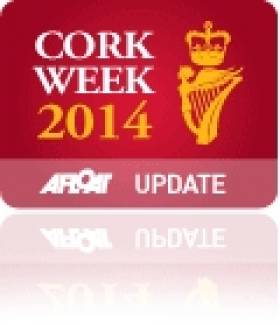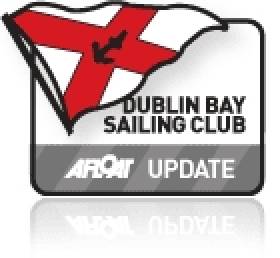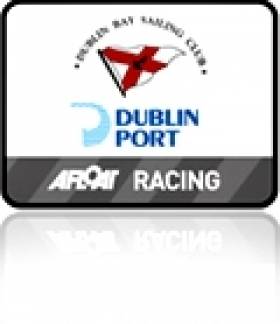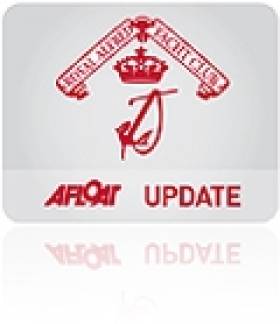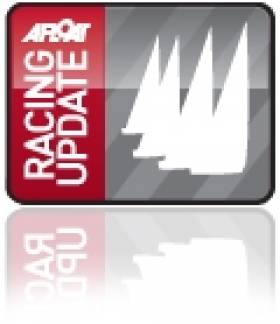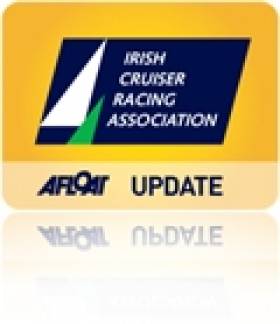Displaying items by tag: J109
#ruffian23 – The Ruffian 23 National Championships take place this weekend, hosted by the National Yacht Club in Dun Laoghaire and are being held in conjunction with the J109 National Championships.
Seven races on Dublin Bay are scheduled over three days – two scheduled on Friday 18th, three on Saturday 19th and two on Sunday 20th.
There will be 15 plus Ruffians competing with two travelling down from Carrickfergus in County Antrim. Trevor Kirkpatrick (sailing Carrageen), commodore of newly reopened Carrickfergus SC, will be defending his title as current Ruffian 23 national champion.
#j109 – After several seasons of success on both inshore and offshore circuits, the Irish J109 class is expanding and hopes are high that the Irish title to be decided in Dun Laoghaire and not Cork as previoulsy announced, will be a 14–boat event.
London 2012 Olympic race officer Jack Roy will be in charge of the National Championships from Friday 18th July to Sunday 20th July at the National Yacht Club. Wires were previously crossed when a January piece indicated Cork Week would be the 2014 venue.
The Irish J109 fleet is expanding with two new new boats joining the Irish fleet this year.
There is now also a number of J109s from Wales and the West coast of UK participating in Irish events.
The 'Celtic Sea' area now boasts16 boats and the Irish class has forged much closer ties with UK sailors to promote a competitive sailing scene for the J109s.
The hope is to have at least 14 boats on the start line for the Dublin Bay Nationals.
J109s to Settle National Title at Cork Week 2014
#corkweek – Since 1978, sailors from Ireland and all over the world have enjoyed Cork Week writes Louay Habib. One of Ireland's top regattas has evolved over the years, taking into consideration the changes within the sport but the sailing grounds in and around Cork Harbour have stayed the same. Cork Week offers a variety of courses from Atlantic wind and waves to the tricky tidal confines of Cork Harbour and the legendary 'craic' ashore, hosted by the Royal Cork Yacht Club, significantly adds to the fun.
J Boats
Once again, the J/109 Irish National Championship will be held at Cork Week. A fleet of 20 yachts from Ireland, UK and overseas is expected, confirmed J Boats, Paul Heys. "J Boats has just completed an excellent London Boat Show and we can definitely see a resurgence in demand for J Boats right across the range. The J/109 Irish National Championship has always been a very popular event and we expect a good turn out for Cork Week. The J/70 design is going from strength to strength, with over 600 boats sold in America and Europe. In November, Maurice 'Prof' O'Connell was appointed J Boat dealer for Ireland and we are already seeing demand for the new Sportsboat in Ireland, we expect to see a number of J/70s competing at Cork Week.
High Performance
South African, Mike Bartholomew's Mills 40, Tokoloshe was runner up to Piet Vroon's Dutch Ker 46, Tonnerre de Breskens in 2012 and hopes to return to Cork Week with his new GP42, Tokoloshe.
"The new Tokoloshe needs quite a few modification to get it competitive for IRC and we are working on that now." confirmed Mike Bartholomew. "We hope to come to Cork Week and I am really excited about the prospect, as the competition, the courses and the conditions will, as always, produce excellent racing."
Capable of surfing at over 20 knots, the all carbon flyer will revel in the Cork Week courses on the Atlantic Approaches and Tokoloshe may not be alone. Hamble UK based, High Performance Charter, has similar yachts available to charter for Cork Week.
"Cork Week provides well run races in perfect conditions for fast light displacement race boats. High Performance Charter has a range of yachts available including GP42, Ker 40 and Mills 43." confirmed Bryan Davies. "These yachts will be in top condition for racing and the package includes delivery from Hamble to Cork and back. Basically a team can fly in to Cork have a real blast and fly home again."
Falmouth Boys
Tim Cunliffe's Cornish Half Tonner, Insatiable will be returning to Cork Week after coming runner up in IRC Three last time out. Tim explains why the crew from Falmouth will be coming back, proudly flying the Royal Cornwall YC burgee.
"First and foremost, in 2012 we had a successful Cork Week after arriving with no expectations, so I guess it is rather dangerous to be returning! We had great racing with the RCYC Admiral's team, Bad Company, and we would love another battle with them. We really enjoyed the Irish hospitality and Cork Week delivers the best IRC racing anywhere.
I know that there will be a Cornish contingent coming to race this year. There is an affinity between Cornwall and Ireland given the celtic roots, but also because the scenery is very similar in many ways, there has always a good number of boats from Falmouth that have come to Cork over the years."
1720 Sportsboat
A sizeable fleet of 1720 Sportsboats is expected for Cork Week from Dublin and County Cork based. Sailors from overseas will be joining Irish crews and chartering bareboats boats for their own teams. Jamie McWilliam grew up in Cork but has settled in Hong Kong. This summer McWilliam will be returning to race in the 1720 Class
"For the last few years, the 1720 Class has been having a revival in Ireland and I have been keeping up to date with mates, who tell me the racing is awesome. There is little you can do to optimise the boat, so it is really good one design racing and whilst the size of the fleet has been increasing, so has the strength in depth. For Cork Week, the 1720 Class will have some really great sailors competing and the spirit on and off the water will be superb. 20 years ago, courtesy of Tom Roche and the legendary Noddy, we had the best Cork Week ever and we are looking to wallow in nostalgia in 2014 - but with children this time!"
Cork Week Race Chairman, Anthony O'Leary has confirmed that he will be racing Ker 39, Antix with a very strong Irish team.
"It is very encouraging to see that we will have some excellent yachts and top class sailors coming to enjoy Cork Week but the event has always been about a variety of sailors and yachts, everybody will be made very welcome. The Royal Cork Yacht Club will open its doors to all competitors. As in recent years, Cork Week will serve up a variety of courses both inside and outside the harbour and besides outstanding racing, Cork Week will have a great atmosphere ashore."
The entry fee for Cork Week 2014 will also be reduced by 30%, compared to 2012 and the reduction in racing days and other measures will effectively reduce the overall cost of attending Cork Week by at least 20%.
Entry for Cork Week 2014 can be made via the official website or by contacting the Regatta Office: 00 353 (0)21 4831179
#dbsc – The National Yacht Club J109 cruiser racer Ruth lifted the Viking Marine sponsored DBSC Spring Chicken trophy on Sunday after a four race series that saw the final leg of the popular all–in series cancelled due to north westerly gales on Dublin Bay.
John Maybury's consistent performer Joker 2 lead the fleet in to the halfway stage of the series. The Royal Irish contender was five points clear of sistership Ruth after two races but the Liam Shanahan entry from the NYC edged it in the end taking honours ahead of the Grand Soleil 40 Orna after four races and one discard.
Third was the Archembault A35 Another Adventure. Full results downloadable below as an MS Word file.
J109s Continue to Lead the 44-Boat Spring Chicken fleet on Dublin Bay
#DBSC – John Maybury's consistent performer Joker 2 leads the fleet in to the halfway stage of the Viking Marine sponsored Spring Chicken series this Sunday. The Royal Irish contender is five points clear of sistership Ruth, the Liam Shanahan entry from the National Yacht Club. Just half a point adrift is the Grand Soleil 40, Orna. The full results from last Sunday's breezy outing plus the overall results to date are downloadable below as a word file
More J109 Offshore Success as Jedi Lifts Royal Alfred YC Coastal Cup
#RAYC – It was only in the last race that Andrew Sarratt's Jedi from Dun Laoghaire moved from second to win the 2012 Royal Alfred Yacht Club (RAYC) Coastal Series run over three races in association with ISORA. Full results for the Dublin Bay based series are available for download below as an MS Word document.
It is another offshore win for the J109 class, a design that has proved unbeatable offshore this season.
The RAYC has awarded two trophies for the coastal series - one for the Gold fleet and another for the Silver fleet.
African Challenge, a Beneteau First 42, won the silver fleet.
The Royal Alfred Yacht Club Dinner and Prize-giving takes place on Friday 30th November in the National Yacht Club.
Welsh Yacht Moves into Commanding Lead for ISORA's Overall Trophy
#isora – After the weekend's cross channel offshore race to Pwllheli, the North Wales J109 yacht Sgrech is in a commanding position for ISORA's Wolf's Head Trophy overall but Dublin Bay's Joker 2 (John Maybury) can still steal the silver by good results in the remaining races that are usually well supported writes ISORA's Peter Ryan. RESULTS AVAILABLE FOR DOWNLOAD BELOW AS EXCEL FILE.
The light weather forced the retiral of four boats from the fleet of 12 starters. Some boats retired within sight of the finish line.
The weather forecast for the race was deadly accurate with south westerly 8-10 knots at the start rising to southerly 16-19 knots and falling again in the evening to south easterly 4- 6 knots.
The upwind start crowded many of the boats at the Committee boat end of the line where NYC Vice Commodore, Larry Power, sent the fleet of 12 boats off toward the Muglins. The course for the race was: Start – Muglins (S) – Moulditch Buoy (P) – Finish in Pwllheli. The course allowed boats to pass either side of Bardsey Island and St Tudwal's Island on route to Pwllheli.
Lula Belle got the best clear start from the pin end and raced towards the Muglins while most of the fleet at the other end of the line shadowed each other from the little wind that was there. Lula Belle's early lead soon disappeared as the fleet left Dublin Bay and sailed into a hole in Killiney Bay.
This was not the last hole to be found by the fleet. Killiney Bay caused problems for most of the boats who got trapped with no wind and a strong foul tide. Again, Lula Belle, made a spectacular break from Killiney Bay by sailing deeper into the hole and coming out the other side with a stronger different wind than the remainder of the fleet. Only four boats managed to get away early from Killiney Bay while the rest of the fleet were stranded.
The four boats proceeded towards Moulditch – Lula Belle followed by Sgrech, Joker 2 and Adelie. After Moulditch the leg to Pwllheli was a tight white sail reach. No distance was gained or lost between the four boats as they crossed the Irish Sea. Lula Belle held it lead until the wind dropped as they approach St. Tudwals. Sgrech overtook Lula Belle for the lead heading into Abersoch Bay.
The last section of race to the finish was a light air run. Sgrech managed to pull away from both Lula Belle and Joker 2 to take 1st place Overall and Class 1. Lula Bell held off Joker 2 to take 2nd Overall and 1st in Class 2.
Lancastrian took 1st place in the Silver Fleet to extend his overall lead in this division. For full results see the attached links. The finish in Pwllheli was provided by Gerry Williams, past Commodore of Pwllheli Sailing Club.
The present results puts Sgrech in a commanding position for the Wolf's Trophy overall championship. However, Joker 2 can still steal the silver by good results in the remaining races that are usually well supported.
The next race is the M2 Day Race on the 1st September with a 10.00 start.
The course will be set to ensure that all boats are back in Dun Laoghaire at 19.00 latest.
#RACING ROUND–UP – Ireland's Star pair Peter O'Leary and David Burrows are in the frame at the Star worlds in Hyeres this morning having held the lead after thie first two races, James Espey is Olympic bound in his Laser dinghy following qualification in Germany last night, Alexander Rumball and Rory McStay are joining the Irish ISAF Youth Worlds squad as Ireland's first Catamaran pairing, Offshore J109s continue to dominate on the Irish Sea and ICRA is still seeking support to mount a defence of its 2010 Commodore's Cup victory.
Kinsale's Marcus Hutchinson won the South Coast Squibs, JP McCaldin was on form at the J24 Easterns in Howth, Derek Mitchell was top in Saturday's DBSC Ruffian race, Foynes Yacht Club cruised to Limerick and Andrew Algeo emerged a winner in a class that have changed much more than their racing format.
J109 Yachts Revel in Strong Wind ISORA Race to Arklow
#OFFSHORE – The stable, easy to sail and performance attributes of the J109 came to the fore in a blustery start to the ISORA season on Saturday, the Rod Johnstone design taking the top two places overall in the 18-boat fleet. Photos from yesterday's start below plus full results in pdf format for download.
Racing in between gale forecasts the first race of the season from Dublin Bay to North Arklow and back was won by top DBSC performer John Maybury's J109 from the Royal Irish Yacht Club. Joker 2 beat 36–foot sistership Jedi skippered by offshore campaigner Andrew Saratt by a three minute corrected time margin.
Despite strong north-easterly winds, 18 boats (and a good cross section of sailing cruisers some drawn from the ranks of the local bay fleet), came to the Scotsman's bay start line from an entry list of 23 at 10.00am. The conditions were not as bad as last Tuesday when even trawlers found the going tough on the east coast but there was nevertheless a good sea running.
The 42–mile course took the fleet around South Burford and against the tide to North India. In the very lumpy seas around Codling Bank the fleet beat out to East Codling before turning to the finish.
Absent from the first race was Irish Sea champion Matt Davis' Sigma 400 Raging Bull. The 'Bull' is the ISORA Champion for 2010 and 2011 but was damaged last week during the north-easterly storms when moorings failed in Skerries in big seas and the yacht was blown onto rocks. Davis is hoping to get the boat repaired and to defend his title.
The second ISORA race is on Saturday 5th May, the 60–mile Round Ireland Yacht Race qualifier race from Dun Laoghaire to Holyhead where some some new additions to the ISORA fleet are expected into the race.

Run in conjunction with the Royal Alfred Yacht Club racing was started by RAYC Commodore, Barry MacNeaney

Irish Offshore Sailing's Desert Star was the winner of the Silver fleet
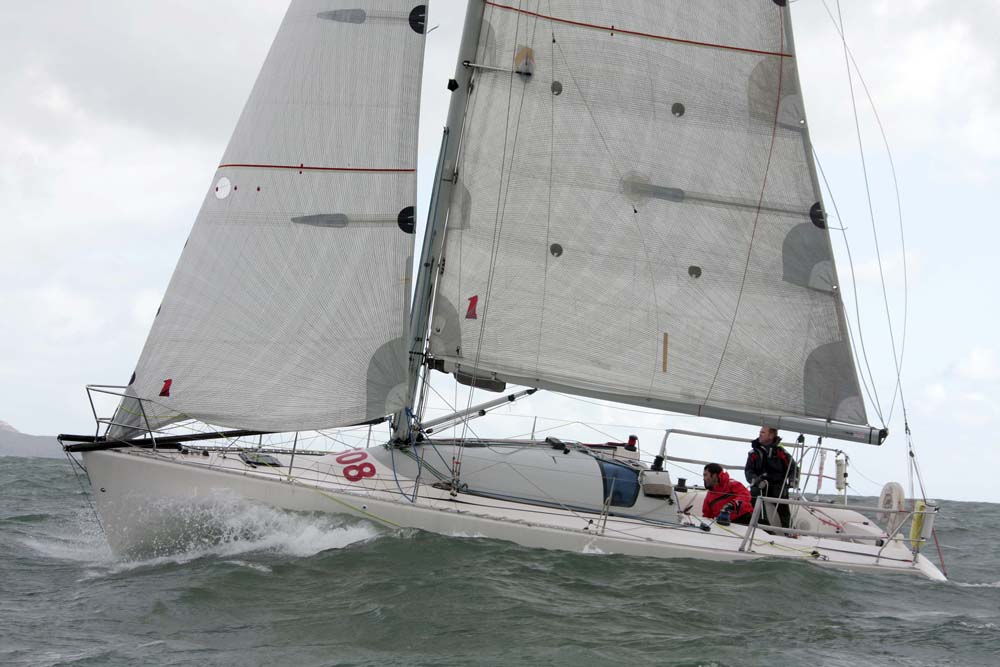
Dinah, Barry Hurley's double-handed Jeanneau was third in the race from Dun Laoghaire to Arklow
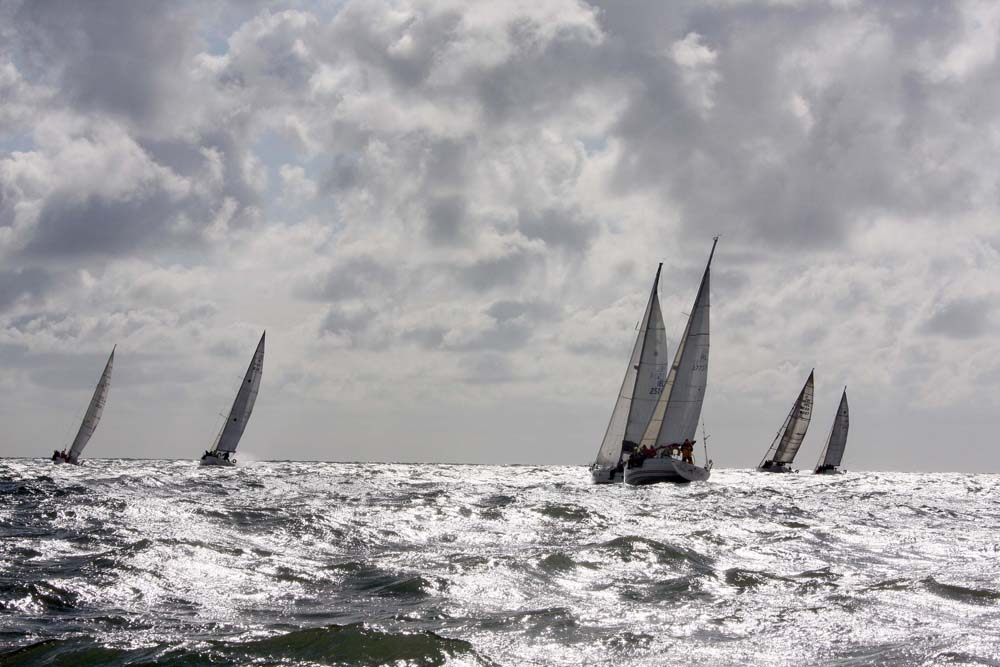
Big seas on the way to Arklow for 18 yachts competing in the first ISORA of the season. More ISORA fleet photos below.
ICRA Hears Appeals for Greater Participation in Sailing
#SAILING – The tenth Annual ICRA Conference took place in Dun Laoghaire for the first time on 26th November in the same year ICRA was awarded the Mitsubishi Club of the Year trophy writes ICRA Commdore Barry Rose. It was a well attended event by a very representative group of sailors and club representatives from all Coasts of Ireland.
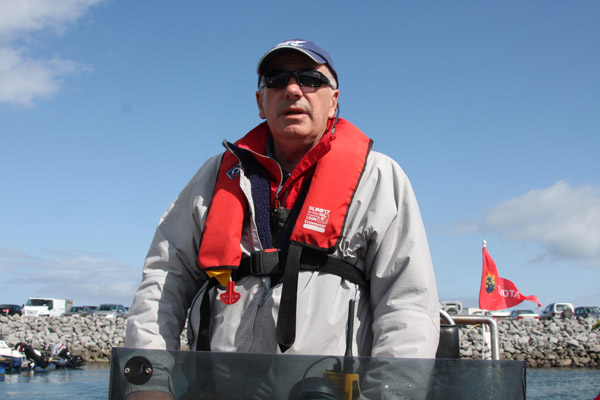
Barry Rose Chaired the ICRA Conference in Dun Laoghaire
The format this year created an inter active discussion in the morning session on Class Bands and the promotion of participation in Cruiser Racing in general. A lively, frank discussion took place with strong views being expressed by most present highlighting the problem of attracting crews to enable boats to go racing and creating access to allow those interested to go sailing to participate in the sport.
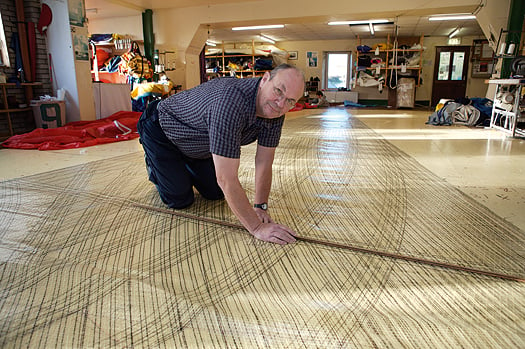
Des McWilliam spoke passionately about Irish sailing - Photo: Bob Bateman
Sailmaker Des McWilliam made a strong appeal that the future of the sport was threatened by difficulty in accessing getting afloat and sailing by the Club structures that were becoming more of a closed shop approach. Maurice O'Connell also spoke passionately on the same subject and examples were given of difficulties encountered both In Cork and Dublin in gaining access to participating in sailing and racing while boats were remaining tied up for lack of crews.
An understanding of the dilemma for the Clubs was also expressed by Flag Officers present in maintaining their facilities for those paying membership while encouraging new sailors to gain access at reasonable cost for a period.
It was agreed that all present would make every effort on a personal basis to encourage opportunities for those interested to go sailing to gain opportunities on boats and access to Club introductory offers.
ICRA will also explore creating an on line vehicle for available crews to register so boat owners gain opportunity to make contact.
There was also suggestions aired that bottom end of Class 1 should be included in Class 2 where all would have better racing.
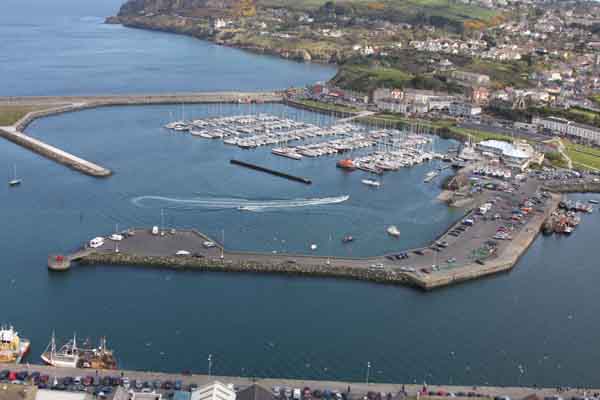
Howth, the venue for the 2012 ICRA Champs
The Royal Cork Yacht Club was complimented for running a top Class ICRA National Championships in June. Howth Yacht Club gave an update that arrangements are well progressed for an exciting ICRA National Championships in Howth 25th to 27th May 2012. The previous weekend will host the Corby Cup which will encourage those travelling to participate in Nationals and ISORA will run a feeder Race from Wales. It is hoped to announce a Sponsor shortly. Howth plan the first Race for 1600 hrs on Friday to avoid necessity for those travelling to stay over on Thursday.
The main feature of the afternoon session was a similar open forum with Race Officers Jack Roy, Henry Leonard and Harry Gallagher joining the top table for an open discussion on course types that sailors wanted and communications sailors would like with Race Officers. This was also a lively session with frank constructive exchanges which was of benefit to sailors and Race Officers alike.
The feeling of the meeting was that in addition to windward /Leeward courses sailors wanted a good variety of course types both at National Championship level but also at Regional events. Also those present strongly requested that boats over the line at starts be informed whenever possible but on strict understanding in Sailing Instructions that there be no redress in any circumstances relating to same against Race Officers.
Both these forums provided an excellent opportunity for those attending to air their views on all matters relating to Cruiser Racing and to offer ideas and this will be developed further for future conferences.

Commodore's Cup Captain Anthony O'Leary. Photo: Bob Bateman
The Commodore reported on efforts to form a team to defend the Commodore's Cup in 2012 and Anthony O'Leary brought the meeting up to date in changes to the event format and expressed confidence that there would be a positive response to ICRA 's request for declarations of interest to form a credible team to defend the Cup as is Ireland's responsibility.
Denis Noonan of Wicklow Sailing Club expressed the Clubs upset and disappointment that an Irish Club would arrange a competing event The Round Rockall Race from Galway starting on the same day as their Iconic Round Ireland Race. They outlined their plans for the 2012 Round Ireland Race and received support for their efforts from those attending. The RORC has increased their points scoring for the Round Ireland Race as further recognition of its standing in World offshore racing. Both ICRA and the ISA confirmed their support for the Round Ireland Race.

Pat Kelly's Storm is ICRA's Boat of the Year. Photo: Bob Bateman
The Conference finished with the presentation of the magnificent crystal ICRA Boat Of The Year trophy for 2011 to Pat Kelly's J 109 Storm who won the ICRA Nationals in Cork in June, The Cruiser Challenge in Dublin in August, The Howth Autumn Series and also travelled to the Scottish Series and Sovereigns Week. It was felt she embodied the spirit of a well campaigned ICRA cruiser racer. A week later Kelly became Afloat's Sailor of the month for November.


























